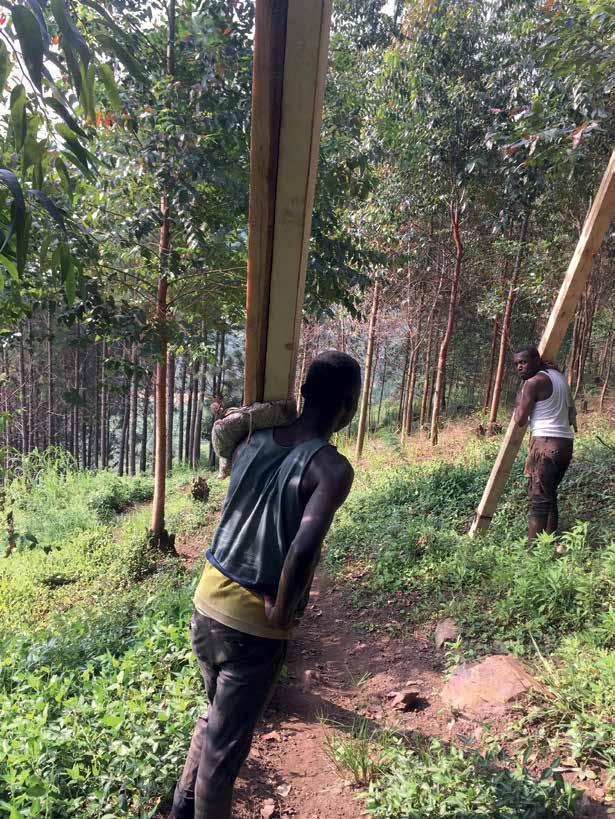
10 minute read
INTERNATIONAL
Supply and demand, demand and supply
by Andrew Heald
“Just to settle it once and for all: Which came first, the chicken or the egg? The egg – laid by a bird that was not a chicken.” Neil deGrasse Tyson
Iam very lucky to be able to occasionally take time away from my Confor role, and work with WWF International on their New Generation Plantations (NGP) Project. Whether it is Uganda, Uruguay or UK, many of the sustainability challenges facing forestry companies and local communities are very similar.
On a recent visit to Uganda, I was struck by the parallels with the UK and the issues and the need for predictable long term timber supply. When I first visited Uganda in early 2018, the UK timber market was strong and prices for home grown timber were high. in November 2019 the market has moved considerably and we are seeing the full impact of very large scale sanitation felling in parts of Europe to control Ips typographus. The supply and demand puzzle in the forestry sector is a key challenge whether your rotations are ten years in Uganda or 40 years in the UK. People won’t plant trees unless there’s a reliable future market demand for timber – and people won’t invest in sawmills and processing unless there’s a reliable future timber supply.
In 1919, the UK Government decided to tackle this conundrum by passing the Forestry Act and founded the Forestry Commission, thereby driving the creation of largescale plantations directly funded by public money. In 2019, Uganda faces similar challenges with an increasing demand for forest products, but compounded by rapidly disappearing natural forests. In the early 1990s Uganda had 24% forest cover, it is now 8%.
Unregulated With a large percentage of the timber market being unregulated it is challenging for legitimate businesses in Uganda to invest and expand. The post-colonial history of East Africa has not been stable and Uganda’s political and population challenges often begin outside its borders, adding risk for investors.
In a country with one of the fastest-growing populations in the world, with a huge demand for timber in construction and whose natural forests are rapidly disappearing, there would seem to be a huge opportunity to develop sawmills and expand the plantation sector.
If we want to support and expand sustainable plantations and a sustainable timber supply chain in Uganda (and the UK), then we need to support the growth of small and medium-sized enterprises (SMEs) in the supply chain. It is SMEs that will grow much of the timber, harvest the timber, haul the timber, replant the plantations and maintain them, and use the secondary products.
If we can support an economy where these SME have the confidence to invest and grow, then we have some of the key building blocks for a sustainable forest economy. A wide range of small businesses is also more resilient to changes in economic fortune. These SMEs will probably need the ‘heft’ of a bigger
MAIN CHALLENGES FOR UGANDA’S FORESTRY SECTOR
‘Informal’ timber: There is a big demand for Ugandan timber in the ‘informal’ sector – often sold at the roadside without the usual accounting procedures. Timber sold without VAT will be 18% cheaper than identical timber in the formal sector.
Export ban: The Ugandan government has imposed a ban on timber exports, to tackle rampant deforestation and encourage investment into Ugandan sawmilling (although timber exports are a minor driver of deforestation, behind clearance for farmland and local charcoal and fuelwood demand). This limits market development for Ugandan companies.
Data: Investment in timber processing requires a knowledge and confidence in future timber supply. On my visits to Uganda I have been told that there are 60,000ha of plantations; I’ve also been told that there are 120,000ha. Any investor needs reliable information onha, location, species and growth rates. Standards: Timber and forest products are usually cut to standard sizes and graded by strength. If an architect or engineer specifies that a roof truss is built with C24 100mm by 50mm timber, then that is what will be supplied. The size of the informal market in Uganda undermines much of the price premium for quality graded timber. There is a role for government and trade associations to more closely regulate timber quality, to level the playing field and improve construction standards.
Expertise: Many Ugandans who own plantations aren’t forestry specialists. They have been encouraged to plant trees usually through an incentive scheme (from government or other agencies) and are often unaware of how best to market their timber or trends in market prices. Bringing timber to market only occasionally, perhaps once every 10 years, they are not in a strong position to negotiate. Many also lack silvicultural knowledge on how best to manage their investment in plantations.
player – like a large plantation company or sawmill (or the government) – to act as a keystone business to give everyone else the confidence to invest and grow.
Many of the challenges in Uganda aren’t really forestry challenges: they are business challenges, compounded by operating in a rapidly changing country where regulations are sometimes unevenly applied.
There may be no neat, simple solution. But that doesn’t mean there is no way forward, and increased urgency is needed, because the scale and speed of landscape change and forest loss are acute.
A lot is written about the need to take a landscape-scale approach to tackle big issues like deforestation, climate change and sustain

able development – and that type of thinking is needed in Uganda. That requires different actors within the landscape to work together towards a common vision.
In the UK, in a potential postBrexit and post-CAP world, with increasing demands for very largescale forest creation we also need a common vision and for stakeholders to increasingly work together. On the hundredth anniversary of the forestry act, we should perhaps be more grateful that back in 1919 the building blocks were put in place for the dynamic forest industry we have today. In Uganda we know what building blocks we need, the challenge is whether we can simply rely on the ‘free market’ to pay for those blocks.
Alan Ralph Powell Alan Ralph Powell was born on 14 September 1936 in Flintshire, North Wales, the eldest of four children belonging to Ralph and Annie Powell. When Alan was a boy, the family moved from Wales to Manchester. In Manchester, Alan passed his 11+ and attended Burnage Grammar School for Boys. He left in 1953 armed with 6 O’ Levels and enough money for a train fare to get to leafy Taunton in Devon to start training for a career in Forestry with the Forestry Commission (FC).
However, on the 25th September 1954, Alan enlisted in the Army, joining the 3rd Battalion of the Parachute Regiment in Aldershot. Whilst in the Paras, he trained in Cyprus and was deployed in the ill-started Suez operation, being one of the lead troops on the assault and capture of the Egyptian Airfield at El Gamil.
After his service in the Paras, Alan left to complete his training with the FC in Taunton, qualifying in July 1959. In 1961, he left the FC and joined the fledgling company Forest Thinnings Ltd.
Alan met his future wife Ruth in Taunton in the summer of 1961 and they married in March 1962. They subsequently had three children. The family moved to the South East of England when Forest Thinnings moved to Alton, Hampshire, finally settling in Four Marks, Hampshire in 1967.
In 1962, Alan showed his vision for the future of Forestry, writing to the head forester of Cowdray Estate asking to demonstrate a new Hiab loading system mounted on a lorry. Alan later joined forces with Swedish manufactures to develop mechanical harvesting and forwarding machines for the south of England. He provided loans from Forest Thinnings to the contractors to enable them to invest in the new development in machinery. Alan’s role in Forest Thinnings progressed to directing their Scottish operations, and he was a key player in developing the export of timber from the UK to other parts of Europe. Forest Thinnings was recognised for the Queen’s Award for Export.
Alan worked for Forest Thinnings for over 25 years becoming a respected innovator. He was instrumental in the growth of the business to make it the leading Forestry company in the UK at that time.
Alan was also part of the team that set up the first APF Exhibition (or APF Demo) in 1976 and was an active Demo team member until 2002. He was also chairman of the APF and involved with the FTA and BTMA.
In 1986, he left Forest Thinnings (then part of the Economic Forestry Group, and later Euroforest) and set up Powell Forestry, assisted by his wife, Ruth. He operated as a sole trader until 2012 when his son Neil joined the business to form the company into a partnership. In 2018, Powell Forestry went Limited, and the following year the business merged under a holding Company Land & Forest Ltd. Alan was still working in the company when he suffered a major stroke whilst playing racket ball. He did not recover and passed peacefully on 23 October 2019.
The ultimate post driver for the professional fencer

M8 Tracked Post Driver 220°
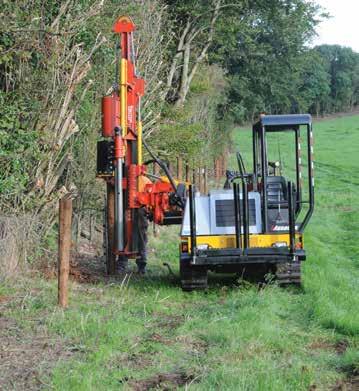
Difficult terrain and inaccessible places no problem



Distributor: Davies Implements Ltd Tel: 01267 237726 Email: sales@daviesimplements.co.uk www.vectorpowerdrive.com
Sennebogen 718e
Upto 15m reach with a selection of attachments the Sennebogen 718e is ideal for ash dieback on tracks and highways
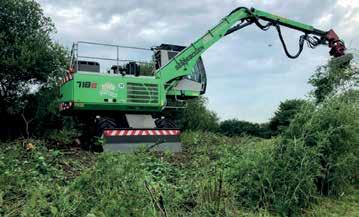

Chipping - Forestry - Site/Scrub Clearance
E: alec@kwrplanthire.co.uk T: 07903 463743 or E: kate@kwrplanthire.co.uk T: 07775 770454 Office: 01476 861342 www.kwrplanthire.co.uk @kwrforestry
www.kwrplanthire.co.uk
Packaging suppliers covering the UK and Europe Packaging suppliers covering the UK and Europe


We specialise in the supply of all types of firewood and kindling net bags, ventilated bulk bags, cubic nets and frames, bag loading trays, polypropylene sacks, standard bulk bags, LDPE sacks and storage tarpaulins. We specialise in the supply of all types of firewood and kindling



We carry a large range of stock in various sizes at our
warehouse for delivery within 48 hours of your order.
We even offer a free personalised print and design service
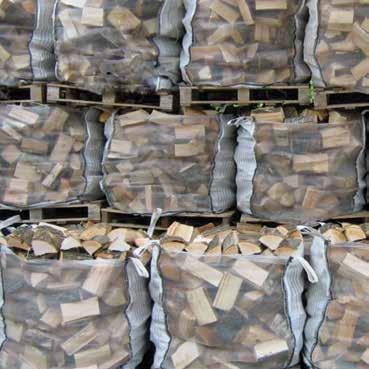
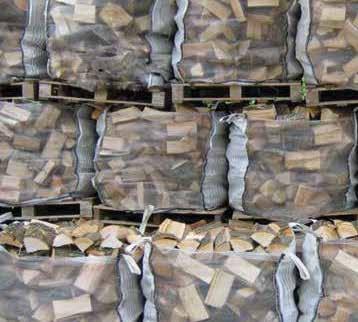
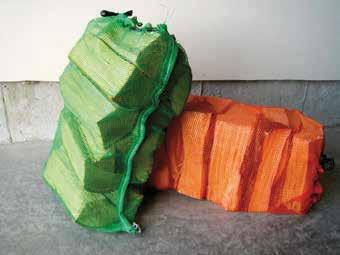
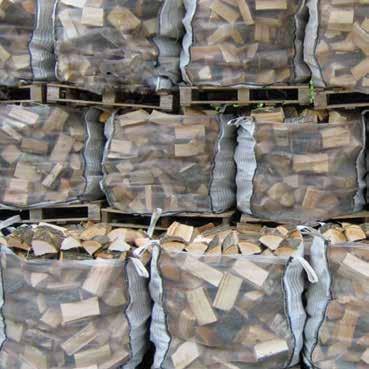



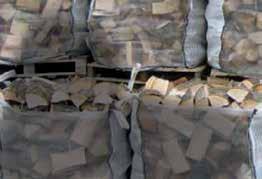




We’ve got it in the bag! so your nets/bags can be ordered with your logo or design. t 01768 862157 m 07798 723040 e info@bagsupplies.com www.bagsupplies.com it in the bag! APF Show 2014 Visit stand: Static a 1 18 th , 19 th and 20 th September










